Genre: Run-‘n-Gun Developer: Sega Ent. Publisher: Sega Ent. Players: 1-2 Released: 1987
Since there were virtually no arcade publishers making games for the Master System, much of its library came from ports of Sega’s bread and butter: its arcade releases. Master System owners in 1987 were the recipients of many great ports, almost all of which were exclusive to the console at the time. I remember always being anxious about going to the arcade, hoping that there would be a new Sega machine there that I could play and determine if a Master System port was possible. My brother and I would periodically check Toys ‘R Us and other stores for new releases, and we were amazed at just how many games actually made the transition.
One of the more surprising titles to come home was Quartet. My brother and I didn’t think this one would be ported because of its four-player design (our local Aladdin’s Castle had the dedicated cabinet, not the two-player conversion kit). Had we known that there was a two-player version, Quartet would have seemed a more likely candidate. I loved the way the dedicated cabinet looked, with its colorful artwork and four play stations. It was just a beautiful machine to look at. As I stood there, soaking in all the greatness that was Sega in the arcade, I told my brother how much I hoped Sega would find a way to bring this one to the Master System.
Needless to say, I was ecstatic when I saw Quartet in the Master System catalogue poster (right next to Wonder Boy, another game I desperately wanted to buy). Finally, I would be able to play the game without going broke, and my brother was equally excited, promising to buy it when it came out. Unfortunately, my family moved before then, to a small town that was far from any major retailer. Only a few people I knew in school had a Master System, and none of them had Quartet. It seemed like fate was playing with my emotions in a cruel, cruel manner, as it would be a long time before I finally got to play it on my console.
Years later, I finally got my hands on a copy of the game, and it’s been a favorite ever since. While I recognize the fact that much has been sacrificed in the home version, it’s still an decent port that captures what made the original so much fun. Featuring simultaneous two-player action, players can choose from the heroically-named Mary or Edger to save Colony Nine from the alien invaders and retrieve Queen Cynthia’s “casket” – she’s not actually dead, just in hibernation. The other two heroes whose names breathe testosterone, Lee and Joe, are sadly cut from the game, but both Mary and Edger play the same, so it’s no loss. Losing half the characters does kind of take away from the name, since there are no longer four heroes. I guess changing the title to Duet wouldn’t have sounded as catchy and would have cost some much-needed brand recognition (though the home version is called Double Target in Japan).
Those familiar with the coin-op will instantly notice that more has changed besides just the loss of Lee and Joe. First off, the size of the game has decreased dramatically, and only six stages are playable compared to the original’s 32. With so few stages, a lot of the graphical variety has been lost, which was something I really liked about the arcade game. Another change is that player’s energy now starts much higher and drains more quickly, and many power-ups, such as the speed up and jump high, are gone. Moreover, enemies simply respawn instead of emerging from generators. I understand that much had to be cut in order to make Quartet possible on the Master System, and while these changes are regrettable, like I said, the home version still manages to retain the essence of its source material. On the bright side, Mary and Edger can now take three hits before dying, which I wager was Sega’s attempt to compensate for the loss of power-ups and changes to enemy behavior.
Differences aside, the Master System does an good job of recreating the arcade’s visuals and feel, though there is a notable loss of detail. The graphics are very colorful and the stages look very nice, giving Quartet a unique style for a side-scrolling run-‘n-gun on the machine. There aren’t many to begin with, but this game manages to stand out from what’s there. The soundtrack is just as good too, offering that classic ’80s Sega goodness, albeit with the Master System’s notable lack of percussion. The game has a great adaptation of Katsuhiro Hayashi’s score, and the main theme always brings a smile to my face.
The goal of each stage is to obtain the magic key from the boss. Stages two and on are divided into two areas, the Surface World and the Underworld. Players use a warp door to move between them as they journey to the boss to get the key. Though most of the power-ups from the arcade version are gone, the handy jetpack is still available, as are goodies like the missile and bomb. An interesting take on the scoring system is that Quartet rewards you in-game for points. Certain scores will allow players to rank up, giving them bonuses like wider and longer shot ranges and extra lives. Two-player games will require sensible sharing of the points if players wish to get to the end.
A single, large star is located in each of Quartet’s five rounds, and all five are needed in order to advance to the final level. They’re often hidden, and failure to find one means levels will have to be replayed until all are obtained. Considering that Quartet is a bit challenging, players will have their work cut out for them if they have to go back. With enemies in the game constantly respawning so quickly, it’s important to keep moving. There’s little time to explore, so finding and learning the location of the stars is imperative. Sure, one can just check the Internet to see where they are, but where’s the fun in that?
The one thing that I didn’t like about Quartet on the Master System is how unforgiving the enemies can be. For a game with no continues, one would think that the game would at least give the player a decent chance at progressing through the stages, but Quartet’s gallery of aliens are sometimes relentless. It’s also frustrating to get hit by an enemy while jetpacking over a pit, as it means instant death. The sometimes odd design of the levels can compound this, since it’s not always obvious where one has to go to reach the boss. The manual actually provides this information at the end, almost as though the developers knew their design was a bit convoluted. Also, at only a half dozen stages, the game is much shorter once players learn its design. Even with a friend tagging along, this means that Quartet doesn’t provide much play time.
While I consider it a run-‘n-gun, I wouldn’t put Quartet up against a game like Contra, as they just don’t seem to play the same to me. I understand that many people make that comparison, but I never saw the two as rivals. Maybe it was because of my initial experience with the arcade game or the fact that I saw the NES version of Contra before the arcade, but I feel they’re two different styles of games. Quartet seems more slowly paced to me than Konami’s classic, and that’s a good thing. The goal isn’t to simply reach the right side of the screen, and that makes it a bit more challenging.
Overall, Master System owners would do well to grab a copy of Quartet. It doesn’t set the gaming world on fire, but it’s classic Sega that’s a lot of fun with a second player. Even the single-player mode is fun, Quartet on the Master System might be a bit watered down compared to the coin-op, but it’s a great way to spend some time with a friend. Grab a friend and go save Colony Nine!
SCORE: 6 out of 10

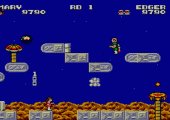
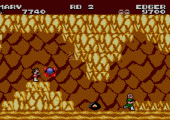
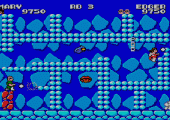
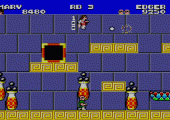
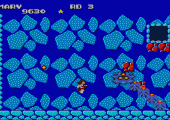
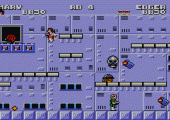
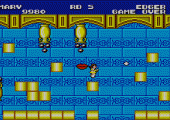
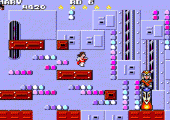
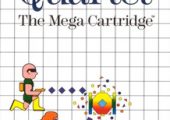
Also, I would have given it a higher score. That’s just me though. Maybe a “7” either way..
Nice article. That’s funny, “Duet”. We had an arcade at the local mall, while it had some Sega games, it didn’t have Quartet. So to me “Quartet” didn’t mean a whole lot. For all I new that was the name of the world or bad guy in the game. So having 2 players to choose didn’t phase me. I really liked this game. I liked the soundtrack and how there were “secrets” in the game. This was one of my fav’s even though it gets lost in the shuffle when I talk about Master System greats.